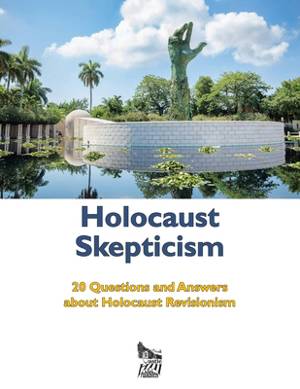
- Afhalen na 1 uur in een winkel met voorraad
- Gratis thuislevering in België vanaf € 30
- Ruim aanbod met 7 miljoen producten
- Afhalen na 1 uur in een winkel met voorraad
- Gratis thuislevering in België vanaf € 30
- Ruim aanbod met 7 miljoen producten
Holocaust Skepticism
20 Questions and Answers about Holocaust Revisionism
Germar RudolfOmschrijving
Who in Their Right Mind Would Doubt the Holocaust Happened?
To ask that question means to have misunderstood the issue. The question is not whether "the Holocaust" happened, but rather what exactly happened during the events usually referred to as "the Holocaust." After all, there is no such place or single event as "the Holocaust." It consists of many individual events and locations spread out over an entire continent during four years.
Let's take the Majdanek Camp near the Polish city of Lublin as an example. How many inmates died in that concentration camp?
If we consult mainstream sources, we get different answers, depending on when they were published.
Shortly after the capture of the camp, the Soviets claimed a death toll of some two million on August 25th, 1944. During the Polish trial in late 1944 against six former camp guards, the Majdanek death toll was set to 1.7 million. Roughly a year later, during the International Military Tribunal, the Soviets claimed that up to 1.5 million inmates had been killed in that camp using seven different gas chambers, among other methods.
This figure, however, was significantly reduced three years after the war, when Polish judge Zdzislaw Lukaszkiewicz, a member of the Polish "Commission to Investigate German Crimes in Poland," published the commission's findings about Majdanek, which set that camp's death toll at 360,000.
The next downgrading came after the collapse of the communist Eastern Bloc, when Polish historian Czeslaw Rajca reduced the death toll down to 235,000. But that was still not the end of the death-toll deflation, because in a detailed research paper of 2005, Tomasz Kranz, then head of the Majdanek Museum, decided to streamline the official narrative by reducing the death toll down to 78,000, and to ditch five of the seven initially claimed gas chambers.
We learn from this that for many decades the official narrative of that camp was filled with exaggerations and inventions caused by wartime propaganda and hysteria. Much of what was initially claimed "never happened," so to say.
And how can we be sure that today's narrative is accurate? We cannot, because "denying the Holocaust" is a crime in Poland, so there is a limit to what historians are allowed to say and write.
So, how can one get to the bottom of this, if relying on mainstream sources seems to be a bad idea? Well, why not start with research results published by non-governmental, independent historians? These "revisionist" historians are usually and wrongly vilified as "deniers," but their thoroughly researched book on Majdanek, first published in 1998, proves them right. In it, they meticulously documented a total of some 42,000 victims of the Majdanek Camp, and the absence of any execution gas chambers. Hence, today's officially sanctioned Majdanek narrative is much closer to what revisionists have found out than to the initial propaganda-infested version, see the chart below.
Anyone with a skeptical mind should rightfully ask: And what else did they get wrong?
This brochure introduces the novice to the concept of Holocaust revisionism, and answers some tough questions, such as:
- What does Holocaust revisionism claim?
- Why should I take Holocaust revisionism more seriously than the claim that the earth is flat?
- What about the pictures of corpse piles in the camps?
- How about the testimonies by survivors and confessions by perpetrators?
- What does it matter whether prisoners died from disease or poison gas?
- Why does it matter how many Jews were killed by the Nazis, since even 1,000 would have been too many?
- Whatever the circumstances, don't Jewish victims deserve respect and compensation?
Specificaties
Betrokkenen
- Auteur(s):
- Uitgeverij:
Inhoud
- Aantal bladzijden:
- 16
- Taal:
- Engels
Eigenschappen
- Productcode (EAN):
- 9781591481980
- Verschijningsdatum:
- 5/03/2018
- Uitvoering:
- Paperback
- Formaat:
- Trade paperback (VS)
- Afmetingen:
- 216 mm x 279 mm
- Gewicht:
- 77 g

Alleen bij Standaard Boekhandel
Beoordelingen
We publiceren alleen reviews die voldoen aan de voorwaarden voor reviews. Bekijk onze voorwaarden voor reviews.









